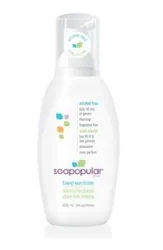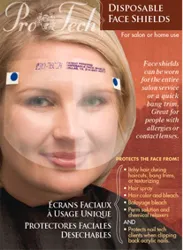
Is Your Salon And Beauty Spa - Protecting Their Clients From Swine Flu Exposure?
On April 29th The Center For Disease Control And Prevention (CDC) reported the first fatality in the United States from the current swine influenza virus.
In addition The CDC released confirmations of growing human infections and hospitalizations. Since most humans do not have a natural immunity to the Swine Flu more deaths, infections and hospitalizations are expected to continue and even grown. The CDC has determined that this strain of the swine influenza A (H1N1) virus is contagious
As in any illness epidemic, The CDC has provided emergency response instructions with the goal to reduce the transmission and severity of the illness. Some groups of people are more at risk from this illness than others.
Those groups include babies, young children, pregnant women, the elderly and anyone with a compromised immune system such as those with chronic heart or lung problems. Also, anyone undergoing chemotherapy or suffering from AIDS or related diseases may be at much higher risk due to their weakened immune systems.
The swine influenza A (H1N1) virus is susceptible to the prescription antiviral drugs oseltamivir and zanamivir. This is a rapidly evolving situation, and CDC will continue to provide updated guidance and new information as it becomes available for the public.
Swine flu infection can be serious. In September 1988, a previously healthy 32-year-old pregnant woman in Wisconsin was hospitalized for pneumonia after being infected with swine flu and died eight days later. A swine flu outbreak in Fort Dix, New Jersey, occurred in 1976 that caused more than 200 cases with serious illness in several people and one death.
How does swine flu spread?
Spread of this swine influenza A (H1N1) virus is thought to be happening in the same way that seasonal flu spreads. Flu viruses are spread mainly from person to person through coughing or sneezing of people with influenza. Sometimes people may become infected by touching something with flu viruses on it and then touching their mouth or nose.
Incubation Period Of Swine Flu
Infected people may be able to infect others beginning one day before symptoms develop and up to seven or more days after becoming sick. That means that you may be able to pass on the flu to someone else before you know you are sick, as well as while you are sick.
How Salons And Beauty Should Protect Against Swine Flu
Due to the fact that Swine Flu is spread by human contact, salons, spas, nail salons, health clubs and any type of beauty service location must take an aggressive approach to protecting all of their clients as well as employees from the spread of the virus. Every establishment that caters to humans for any type of hair, beauty, nail, health or related treatments must implement sanitary safety measures.
The CDC as well as the health and beauty industry suggest the following aggressive protective measures be implemented immediately in all hair, beauty and health business which provide human services where the flu could be more easily spread.
If you frequently visit hair salons, beauty or nail spas, health clubs or other areas where there could be a much higher risk of human check to see if the establishment you visit provides the following protective measures:
1. Provide Readily Accessible Sanitizers In All Common Areas
Hand sanitizers should be located in all key areas throughout all health and beauty common areas such as the reception area, all bathrooms, changing or locker rooms or shared treatment areas. Every hair, beauty and health services provider should distribute hand sanitizer packets to all their employees and encourage them to use them at all times, including when they are off-duty from the salon, spa or health club.
These precautions should not only be utilized by hair and nail salons and spas but fitness centers, yoga or exercise clubs as well as martial arts studios and related.
The Swine flu virus and related bacteria is estimated to be able to live two hours or longer on surfaces such as tables, doorknobs and desks. Frequent handwashing will help reduce the chance of getting contamination from these common surfaces.
2. Require Use of Masks and Gloves Whenever Appropriate
When appropriate, beauty technicians should wear medical-grade protective face masks during any service they provide. Gloves should be worn whenever appropriate and everything must be carefully sterilized and disinfected between use. The service provider should wear flat rather than bubble masks and must refrain from touching their mouths or noses while wearing the gloves. If they do so, ask them to put on a fresh pair of gloves.
When in doubt, ask for details on how your favorite salon, spa or other health and beauty provider is handling the potential spread of disease at their establishment.
3. Schedule Consistent Disinfecting Of Shared Equipment And Related Items
All communal items such as commonly used door handles, phones and shared equipment such as hood hairdryers or hand dryers in communal health clubs areas must be regularly and consistently disinfected. A good rule of thumb is for everything that is touched by a multitude of people to be wiped down once an hour, or more frequently, if that seems appropriate.
4. Medical Grade Disinfectants
All salon, spa and health related treatment rooms must be kept pristine clean to foil the spread of germs. Medical-grade disinfectants should be used when appropriate. Antibacterial soap should be used if medical-grade disinfectants are not appropriate for some reason.
5. Salon And Nail Treatment Stations Must Be Cleaned After Each Client
Any bowls, brushes or other implements must be sanitized appropriately after each client. For extra safely the client chair should be wiped down with wipes, especially where clients rest their hands. As an added measure, individual stations should be regularly sanitized.
6. Treatment Rooms Must Be Kept Pristine Clean
All treatment rooms must be kept clean. All sheets, towels and bedding must be changed and laundered after after use. Any bowls or other treatment implements must be washed with appropriate disinfectants. Product containers storing products for use on clients must be kept sanitized. All products should be first dispensed into sanitized bowls rather than into the practitioner's hands. When possible, gloves should be use.
7. Hair, Beauty and Health Treatment Establishments Should Modify Cancellation Policies As Protective Measure
Although cancellation policies are necessary for most hair, beauty and health club establishments, if a business is serious about preventing the spread of the disease, they will be lenient with their normal policy to encourage clients to cancel appointments if they are ill or feel they are becoming ill.
Some clients will visit a hair, nail or beauty establishment when they are sick to avoid being charged a penalty for cancellation at the last minute. Your beauty and health provider should offer a temporary reprieve of cancellations during the swine flu epidemic crisis.
8. Never Treat Ill Clients
Any ill clients should never be treated, regardless of their claims. If a hair, beauty or health spa client shows any signs of being ill in any way, do not treat proceed with the treatment.
All salons, spas, beauty and health related establishments should send out a newsletter advising their regular clients of their policy to refuse to treat ill clients. A sign should be posted in the reception area and staff should be trained in how to access if a client is ill and should be sent home.
9. Employees Should Be Told To Stay Home If They Are Sick Or Becoming Ill
All hair, beauty and related industry workers should be prohibited from coming to work ill. If they arrive at work and appear ill or become ill, they should be immediately sent home. Furthermore, all employees should be provided with a list of the main symptoms of the H1N1 virus.
H1N1 Symptoms
The symptoms of swine flu in people are similar to the symptoms of regular human flu and include fever, cough, sore throat, body aches, headache, chills and fatigue. Some people have reported diarrhea and vomiting associated with swine flu.
In the past, severe illness (pneumonia and respiratory failure) and deaths have been reported with swine flu infection in people. Like seasonal flu, swine flu may cause a worsening of underlying chronic medical conditions.
10. All Hair, Beauty And Health Service Providers Should Have Backup Schedules In Place
The CDC has advised that the Swine Flu virus comes on very suddenly. All hair and beauty establishments need to make absolutely sure to have backup staffing plans in place to 2uickly replace any employees who may call in sick or be sent home during their shifts.
For More Information
Visit the Centers for Disease Control (CDC) Web site. Not only can you keep up with the latest news about the virus, you can also download a variety of posters to help build awareness about how to protect against passing along the disease and being exposed to it.
Please Follow Me
Please follow me on Twitter at: http://twitter.com/HairBoutique
Social Media Network Information
Please follow us on Twitter at: https://Twitter.com/HairBoutique. I look forward to meeting new people from all walks of Twitter and learning from their Tweets.

















